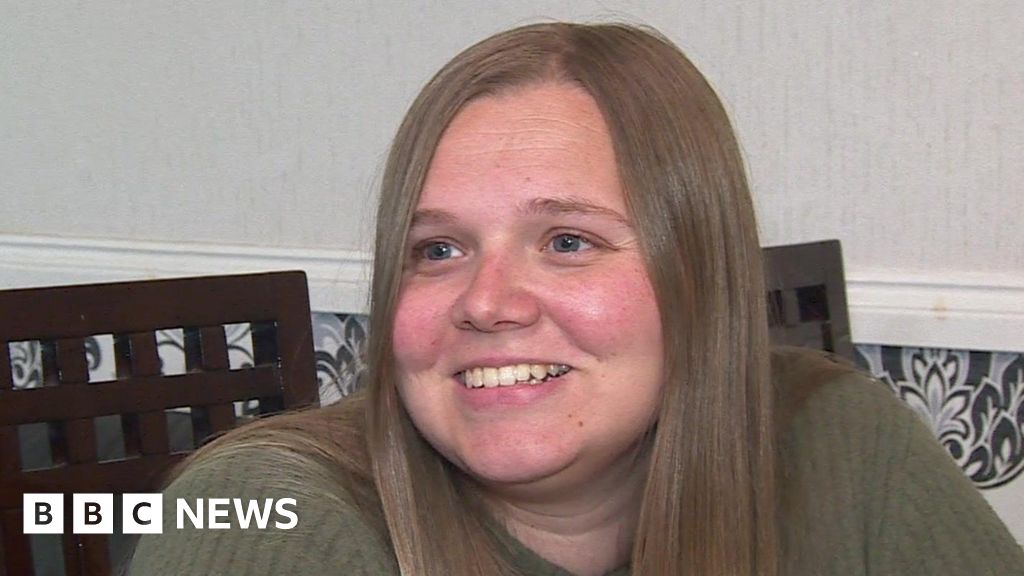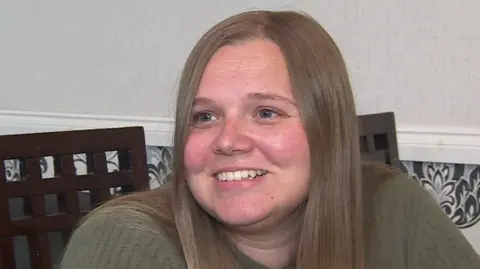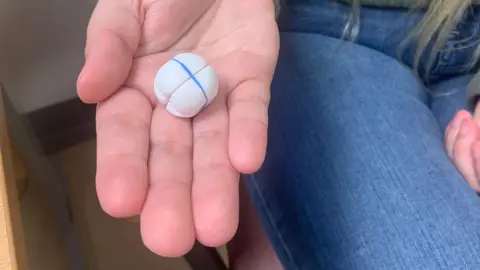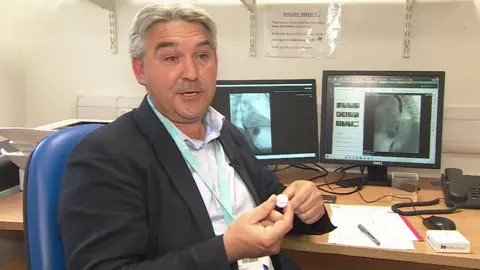Patient hails ‘life-changing’ implant for severe acid reflux

By Alastair Fee, Health Correspondent, BBC South
 BBC
BBCA woman who suffered the debilitating effects of severe acid reflux has described a new implant as “amazing” and “life changing”.
Danielle Harding, 30, could not eat without enduring severe coughing and pain because of gastro-oesophageal reflux disease (GORD).
She was one of the first patients in the UK to receive the implant of a silicone ball into her upper stomach wall.
University Hospital Southampton said there was “excitement” about the early results of the procedure.
GORD occurs when contents from the stomach flow back into the oesophagus – the long tube that carries food from the throat to the stomach.
It happens when the muscular valve – the lower oesophageal sphincter – at the bottom of the oesophagus becomes weakened because it has moved too close to the diaphragm or even into the chest, affecting its function to allow food in and stop acid leaking out.
Up to 9.5 million people in the UK are thought to be affected by the condition.
Symptoms include heartburn, regurgitation, difficulty swallowing, bloating, as well as teeth and gum damage, nutritional problems, and sleep impairment.
It is estimated that up to one in 10 sufferers will develop oesophageal cancer within 10 to 20 years.

Ms Harding, a mother of two from Southampton, said she endured “really horrible” pain at every meal over a two-year period.
“I would get it quite a lot throughout the day, really bad chest pains and it would just like move up into my throat,” she said.
“My nose would start to run and I would get severe coughing and then I’d end up vomiting.
“Going out to eat and having meals – there was anxiety over that because of the fear of what people would think if I suddenly start violently coughing in the middle of the restaurant – would I need to run to the toilet to throw up?”
Current treatments for GORD include drug therapy called proton pump inhibitors (PPI) or a surgical procedure known as the fundoplication method.
Ms Harding was fitted with a new device, the RefluxStop, during a two-hour operation at University Hospital Southampton.
Made out of medical grade rounded solid silicone, the implant measures about 25mm – smaller than a ping pong ball.
Robotic surgery was used to fix it to the upper part of the stomach wall to block movement of the lower oesophageal sphincter.

Fergus Noble, oesophagogastric surgeon at the hospital, said the first uses of the implant were showing “good results”.
“We’re aware of the challenges of the other alternative treatments, whether they be antacid medication or other surgery and the excitement around this is that the early data shows that they get less side-effects compared to the other treatments”
The non-active implant is expected to last a lifetime and patients who receive the surgery should see an almost immediate improvement to their symptoms.
Ms Harding said the operation had changed her life.
“I’ve got no acid reflux, no symptoms of heartburn, not even mild symptoms – I can eat – it’s been amazing,” she said.
Following early implants of the device at Southampton and Imperial College London, it is hoped the implant could be rolled out to other NHS trusts.
Related
Youth football teams hold minute’s silence for 10-year-old Poppy Atkinson
Youth football teams and grassroots clubs across the country have held a minute’s silence at the start of their games to commemorate a 10-year-old girl who di
Girl’s death sparks minute’s silence at football matches nationwide
10-year-old Poppy Atkinson was killed when she was struck by a car during a training session at Kendal Rugby Club in Cumbria. Clubs from Leeds to London
Liverpool fans’ Uefa claim can be heard in England, judge…
The high court, sitting in Liverpool, heard Uefa had relied upon the principle that English courts will not inquire into the legality of actions by foreign gove
Alan Shearer’s Premier League predictions including Manchester United vs Arsenal
Caption: Alan Shearer?s Premier League predictions credit: Getty / Metro After some impressive results for English sides in Europe the focus is













